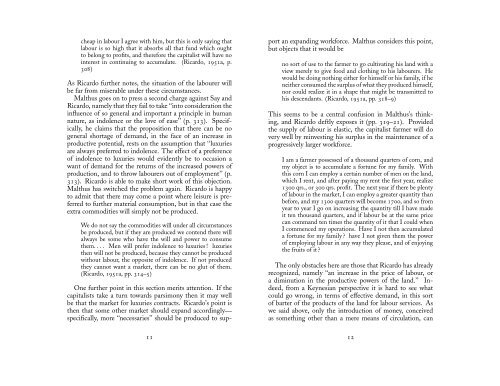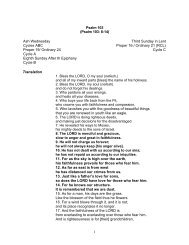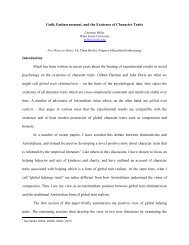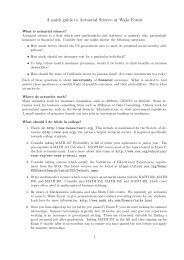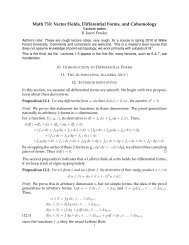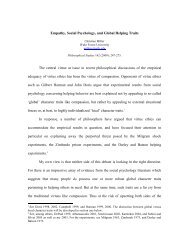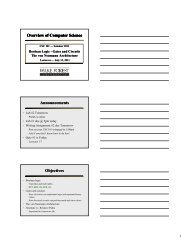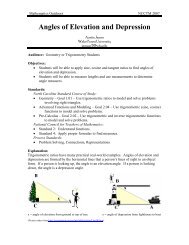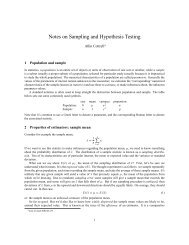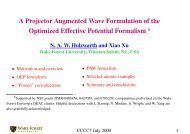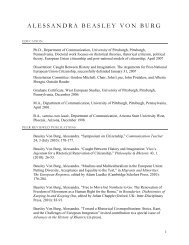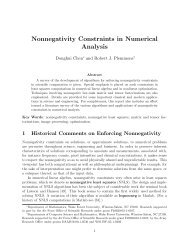Keynes, Ricardo, Malthus and Say's Law - Wake Forest University
Keynes, Ricardo, Malthus and Say's Law - Wake Forest University
Keynes, Ricardo, Malthus and Say's Law - Wake Forest University
Create successful ePaper yourself
Turn your PDF publications into a flip-book with our unique Google optimized e-Paper software.
cheap in labour I agree with him, but this is only saying thatlabour is so high that it absorbs all that fund which oughtto belong to profits, <strong>and</strong> therefore the capitalist will have nointerest in continuing to accumulate. (<strong>Ricardo</strong>, 1951a, p.308)As <strong>Ricardo</strong> further notes, the situation of the labourer willbe far from miserable under these circumstances.<strong>Malthus</strong> goes on to press a second charge against Say <strong>and</strong><strong>Ricardo</strong>, namely that they fail to take ‘‘into consideration theinfluence of so general <strong>and</strong> important a principle in humannature, as indolence or the love of ease’’ (p. 313). Specifically,he claims that the proposition that there can be nogeneral shortage of dem<strong>and</strong>, in the face of an increase inproductive potential, rests on the assumption that ‘‘luxuriesare always preferred to indolence. The effect of a preferenceof indolence to luxuries would evidently be to occasion awant of dem<strong>and</strong> for the returns of the increased powers ofproduction, <strong>and</strong> to throw labourers out of employment’’ (p.313). <strong>Ricardo</strong> is able to make short work of this objection.<strong>Malthus</strong> has switched the problem again. <strong>Ricardo</strong> is happyto admit that there may come a point where leisure is preferredto further material consumption, but in that case theextra commodities will simply not be produced.We do not say the commodities will under all circumstancesbe produced, but if they are produced we contend there willalways be some who have the will <strong>and</strong> power to consumethem. . . . Men will prefer indolence to luxuries ! luxuriesthen will not be produced, because they cannot be producedwithout labour, the opposite of indolence. If not producedthey cannot want a market, there can be no glut of them.(<strong>Ricardo</strong>, 1951a, pp. 314–5)One further point in this section merits attention. If thecapitalists take a turn towards parsimony then it may wellbe that the market for luxuries contracts. <strong>Ricardo</strong>’s point isthen that some other market should exp<strong>and</strong> accordingly—specifically, more ‘‘necessaries’’ should be produced to supportan exp<strong>and</strong>ing workforce. <strong>Malthus</strong> considers this point,but objects that it would beno sort of use to the farmer to go cultivating his l<strong>and</strong> with aview merely to give food <strong>and</strong> clothing to his labourers. Hewould be doing nothing either for himself or his family, if heneither consumed the surplus of what they produced himself,nor could realize it in a shape that might be transmitted tohis descendants. (<strong>Ricardo</strong>, 1951a, pp. 318–9)This seems to be a central confusion in <strong>Malthus</strong>’s thinking,<strong>and</strong> <strong>Ricardo</strong> deftly exposes it (pp. 319–21). Providedthe supply of labour is elastic, the capitalist farmer will dovery well by reinvesting his surplus in the maintenance of aprogressively larger workforce.I am a farmer possessed of a thous<strong>and</strong> quarters of corn, <strong>and</strong>my object is to accumulate a fortune for my family. Withthis corn I can employ a certain number of men on the l<strong>and</strong>,which I rent, <strong>and</strong> after paying my rent the first year, realize1300 qrs., or 300 qrs. profit. The next year if there be plentyof labour in the market, I can employ a greater quantity thanbefore, <strong>and</strong> my 1300 quarters will become 1700, <strong>and</strong> so fromyear to year I go on increasing the quantity till I have madeit ten thous<strong>and</strong> quarters, <strong>and</strong> if labour be at the same pricecan comm<strong>and</strong> ten times the quantity of it that I could whenI commenced my operations. Have I not then accumulateda fortune for my family ? have I not given them the powerof employing labour in any way they please, <strong>and</strong> of enjoyingthe fruits of it ?The only obstacles here are those that <strong>Ricardo</strong> has alreadyrecognized, namely ‘‘an increase in the price of labour, ora diminution in the productive powers of the l<strong>and</strong>.’’ Indeed,from a <strong>Keynes</strong>ian perspective it is hard to see whatcould go wrong, in terms of effective dem<strong>and</strong>, in this sortof barter of the products of the l<strong>and</strong> for labour services. Aswe said above, only the introduction of money, conceivedas something other than a mere means of circulation, can11 12


